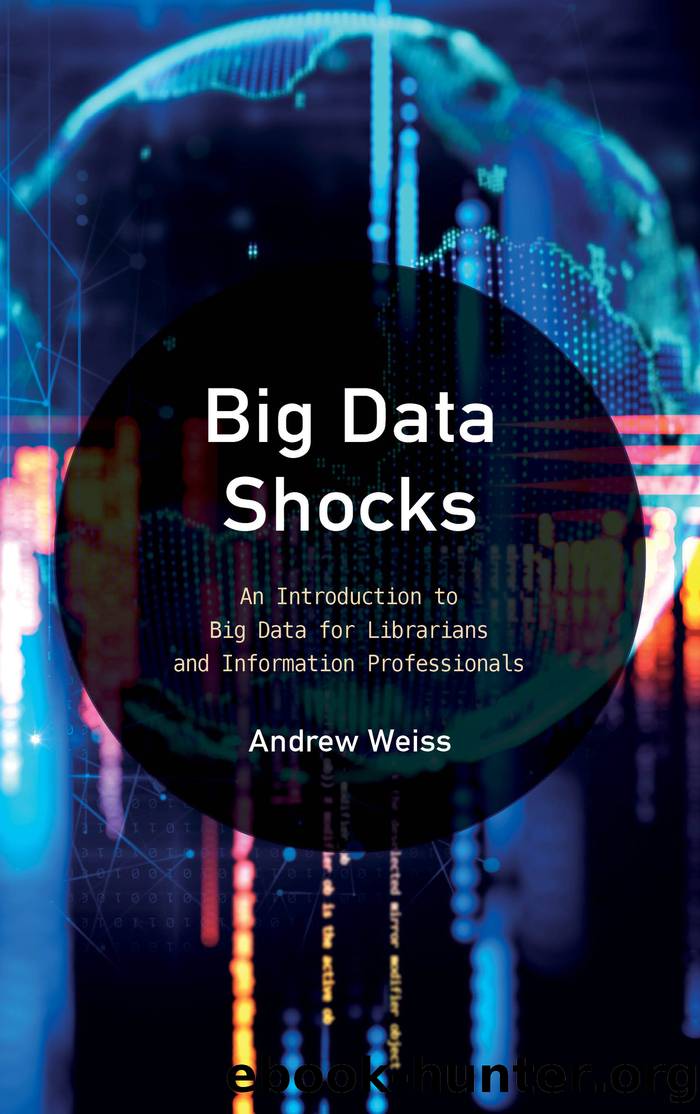Big Data Shocks by Weiss Andrew;

Author:Weiss, Andrew;
Language: eng
Format: epub
Tags: undefined
Publisher: Rowman & Littlefield Publishers, Incorporated
Published: 2012-08-15T00:00:00+00:00
The Shock of Information Overload and Big Data
And further, by these, my son, be admonished: of making many books there is no end; and much study is a weariness of the flesh.
âEcclesiastes 12:12
Depth and Breadth: Omniscience and Omnipresence
The era of big data, for all of its controversial issues with eroding privacy, compromised autonomy, and overreliance on predictive behavior analysis, still finds its fundamental roots in the desire to accumulate information. This desire has appeared in the development of online massive digital libraries such as the HathiTrust, Google Books, or the Internet Archive, each of which attempts to organize and accumulate the full extent of human creation as printed in book form. We are reminded, too, that such ambitious desires for bounding the infinite are ancient ones. The library at Alexandria remains one of the most visible symbols of this desire to encapsulate within finite walls the worldâs broadest reaches of knowledge. It also remains one of the great symbols of loss and represents, as Alberto Manguel (2006) describes it, âa shadow of the worldâ currently existing now. Alexandria is a symbol of not only what we have kept and lost but also what we have excluded and lostâthe universal mind of remembering and forgetting. In contrast, Jorge Borgesâs âLibrary of Babelâ speaks to the impossibility of collecting and managing the infinite, which, as Umberto Eco notes, is a fantasy âwhere mathematics verges on metaphysicsâ (Eco, 2009, p. 369). The desire for the vertiginous heights of knowledge in the Library of Babel combined with the breadth and width of the Library of Alexandria bring us two glimpses of the infinite: infinite knowledge versus infinite information. Add into this mixture the internet, which promises not only omniscience but also omnipresence, and we find ourselves in strikingly new territory where past, present, and future (in the form of futurism and instantaneous dissemination) mingles with the depth and breadth of all human experience.
But we are also finding that the striving for these utopian dreams of complete awareness and universal coverage of the human condition ultimately does little more than expose the limitations of the human mind. Despite studies suggesting that the upper bounds of the human mind are possibly underutilized by huge orders of magnitude (Bartol et al., 2015), in every desire to âaccumulate it allâ there is an attendant feeling of being overwhelmed by it. This sensation of information overload is not new, as Anne Blair has shown in her examination of the historical record. It is a concept that has persisted for centuries, if not millennia. Importantly, she sees information overload not as a negative reaction to any specific technology, or even as a form of technophobia, but instead as a general response to our own desires to preserve information. She argues that âoverload was born from a drive to accumulate and save which became particularly visible in the Renaissance as individuals and institutions collected copies of ancient texts, exotic natural specimens and artifacts, forming the kernel of libraries and museums that have sometimes endured to the presentâ (Blair, 2011).
Download
This site does not store any files on its server. We only index and link to content provided by other sites. Please contact the content providers to delete copyright contents if any and email us, we'll remove relevant links or contents immediately.
| Anthropology | Archaeology |
| Philosophy | Politics & Government |
| Social Sciences | Sociology |
| Women's Studies |
Cecilia; Or, Memoirs of an Heiress — Volume 1 by Fanny Burney(32558)
The Great Music City by Andrea Baker(32019)
Cecilia; Or, Memoirs of an Heiress — Volume 2 by Fanny Burney(31956)
Cecilia; Or, Memoirs of an Heiress — Volume 3 by Fanny Burney(31942)
We're Going to Need More Wine by Gabrielle Union(19046)
All the Missing Girls by Megan Miranda(16028)
Pimp by Iceberg Slim(14507)
For the Love of Europe by Rick Steves(14121)
Bombshells: Glamour Girls of a Lifetime by Sullivan Steve(14075)
Talking to Strangers by Malcolm Gladwell(13370)
Norse Mythology by Gaiman Neil(13365)
Fifty Shades Freed by E L James(13241)
Mindhunter: Inside the FBI's Elite Serial Crime Unit by John E. Douglas & Mark Olshaker(9343)
Crazy Rich Asians by Kevin Kwan(9292)
The Lost Art of Listening by Michael P. Nichols(7506)
Enlightenment Now: The Case for Reason, Science, Humanism, and Progress by Steven Pinker(7313)
The Four Agreements by Don Miguel Ruiz(6765)
Bad Blood by John Carreyrou(6621)
Weapons of Math Destruction by Cathy O'Neil(6280)
